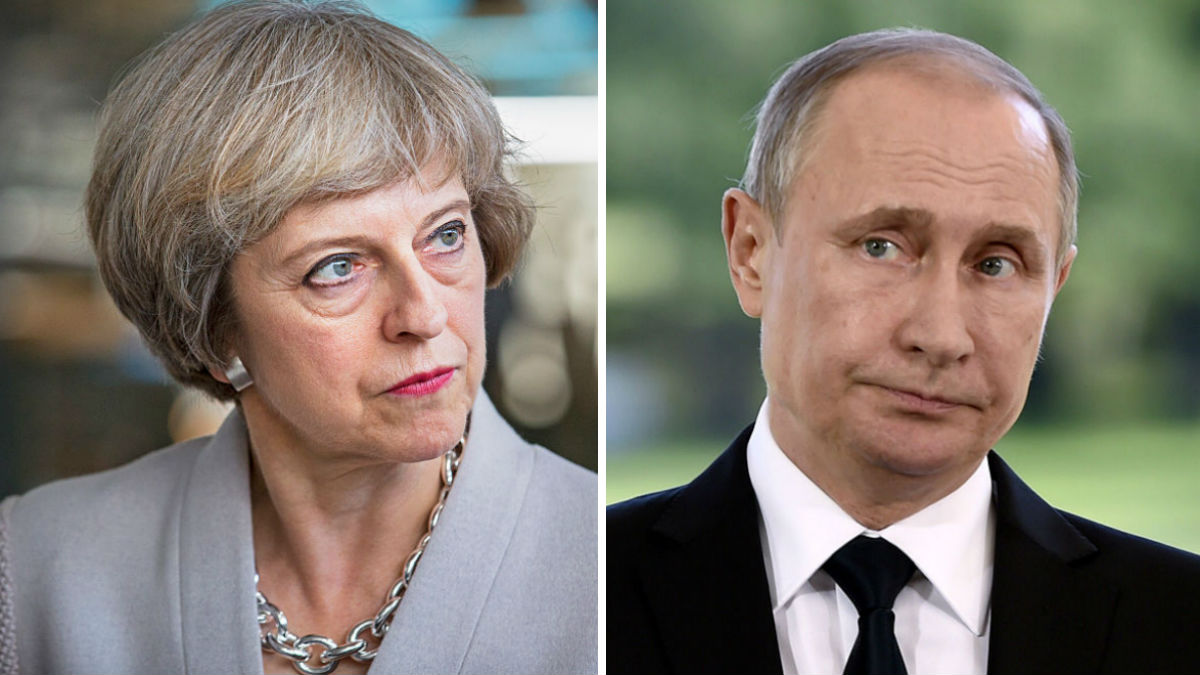Will UK-Russia relations improve under Theresa May?
Prime Minister signals she will adopt a different approach to David Cameron after speaking to Vladimir Putin

A free daily email with the biggest news stories of the day – and the best features from TheWeek.com
You are now subscribed
Your newsletter sign-up was successful
Theresa May has signalled a thaw in UK-Russia relations under her leadership, following her first telephone conversation with President Vladimir Putin since she became Prime Minister.
Diplomatic ties between the two countries have been strained since the annexation of Crimea in 2014 and subsequent UK-led sanctions.
Tensions were further inflamed after the Alexander Litvinenko inquiry in January, when it was ruled that the murder of the former Russian spy in London was likely to have been approved by the Russian leader.
The Week
Escape your echo chamber. Get the facts behind the news, plus analysis from multiple perspectives.

Sign up for The Week's Free Newsletters
From our morning news briefing to a weekly Good News Newsletter, get the best of The Week delivered directly to your inbox.
From our morning news briefing to a weekly Good News Newsletter, get the best of The Week delivered directly to your inbox.
"The report left Putin with radioactive fingermarks glowing all over his collar and May [then home secretary] with the giant headache of trying to sound tough with the Russian president, when everyone knows the British government is terrified of upsetting him," The Guardian's John Crace wrote at the time.
Speaking yesterday, May and Putin expressed their mutual dissatisfaction at the current state of bilateral relations and vowed to improve ties in order to cooperate on the global fight against terrorism.
"[They] agreed that British and Russian citizens faced common threats, and that cooperation on aviation security in particular was a vital part of the counter-terrorism effort," a Downing Street spokeswoman said.
The pair "looked forward" to meeting each other at the G20 summit in China next month, she added.
A free daily email with the biggest news stories of the day – and the best features from TheWeek.com
The Kremlin issued a similar statement, promising to "invigorate joint work" in a number of areas. It also confirmed that the UK had agreed to take part in the 75th anniversary of the first arrival of wartime aid by British convoys to the Russian city of Arkhangelsk later this month.
The Guardian says the discussion shows May is "keen to demonstrate that the UK remains outward looking" and will continue to play a vital role in global democracy, despite voting to leave the EU.
Her position appears to be in stark contrast to that of her predecessor David Cameron, says Sky News's Sophy Ridge. "Cameron's relationship with Putin was prickly at best, poisonous at worst," she says.
"How to deal with Russia is one of the most pressing and difficult foreign policy concerns for May."
-
 5 royally funny cartoons about the former prince Andrew’s arrest
5 royally funny cartoons about the former prince Andrew’s arrestCartoons Artists take on falling from grace, kingly manners, and more
-
 The identical twins derailing a French murder trial
The identical twins derailing a French murder trialUnder The Radar Police are unable to tell which suspect’s DNA is on the weapon
-
 Political cartoons for February 21
Political cartoons for February 21Cartoons Saturday’s political cartoons include consequences, secrets, and more
-
 Putin’s shadow war
Putin’s shadow warFeature The Kremlin is waging a campaign of sabotage and subversion against Ukraine’s allies in the West
-
 Alexei Navalny and Russia’s history of poisonings
Alexei Navalny and Russia’s history of poisoningsThe Explainer ‘Precise’ and ‘deniable’, the Kremlin’s use of poison to silence critics has become a ’geopolitical signature flourish’
-
 What happens now that the US-Russia nuclear treaty is expiring?
What happens now that the US-Russia nuclear treaty is expiring?TODAY’S BIG QUESTION Weapons experts worry that the end of the New START treaty marks the beginning of a 21st-century atomic arms race
-
 Epstein files topple law CEO, roil UK government
Epstein files topple law CEO, roil UK governmentSpeed Read Peter Mandelson, Britain’s former ambassador to the US, is caught up in the scandal
-
 Iran and US prepare to meet after skirmishes
Iran and US prepare to meet after skirmishesSpeed Read The incident comes amid heightened tensions in the Middle East
-
 Israel retrieves final hostage’s body from Gaza
Israel retrieves final hostage’s body from GazaSpeed Read The 24-year-old police officer was killed during the initial Hamas attack
-
 China’s Xi targets top general in growing purge
China’s Xi targets top general in growing purgeSpeed Read Zhang Youxia is being investigated over ‘grave violations’ of the law
-
 Ukraine, US and Russia: do rare trilateral talks mean peace is possible?
Ukraine, US and Russia: do rare trilateral talks mean peace is possible?Rush to meet signals potential agreement but scepticism of Russian motives remain